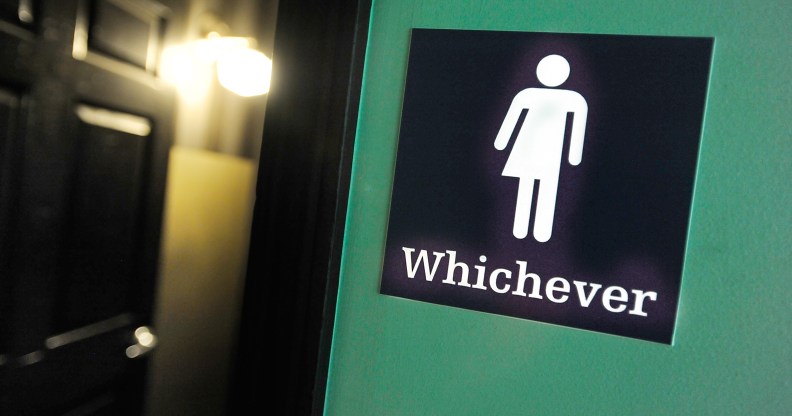Gender-neutral pronouns are a feminist icon that help boost women and LGBT+ people, says science

A gender neutral sign is posted outside a bathroom. (Sara D. Davis/Getty Images)
Using gender-neutral pronouns makes people more positive towards women and LGBT+ people and less biased towards men, scientists say.
Three experiments were carried out to determine the effects of using gender-neutral pronouns on people’s perception’s of women and LGBT+ people.
The results show that “individual use of gender-neutral pronouns reduces the mental salience of males.”
“This shift is associated with people expressing less bias in favour of traditional gender roles and categories, as manifested in more positive attitudes toward women and LGBT individuals in public affairs,” the research, published in the Proceedings of the National Academy of Sciences (PNAS), says.
Efrén Pérez, one of the authors of the study who is a political sciences professor at the University of California in Los Angeles, told The Guardian, “Let’s assume there are societies that generally agree on being more inclusive of women and LGBT individuals, and there are more than a few.”
“Our findings suggest that the words we choose to use can matter in getting us a little bit closer toward reaching that ideal.”
Gender-neutral pronouns reduce gender stereotyping
More than 3,000 people took part in the research, which involved being shown a cartoon of an androgynous figure walking a dog and then asked what was happening in the picture – with one group told to use only neutral pronouns, one female pronouns and one male.
Participants then completed tasks, including writing a story about a person running for political office and answering questions about their views on women and LGBT+ people.
According to the report, using gender-neutral pronouns at the beginning of the task made it more likely that the volunteers would use non-male names in their short story and would have pro-women, pro-LGBT+ views.
Sabine Sczesny, a professor of social psychology at the University of Bern who was not involved in the research, told The Guardian that the research was further evidence that gender-inclusive language could reduce gender-biases and “contribute to the promotion of gender and LGBT equality and tolerance.”
Laura Russell, director of research, policy and campaigns at Stonewall, said, “The language we use is important, especially when it comes to describing or referencing someone’s identity.
“This study adds to the evidence showing that when we use language that actively includes women and LGBT people, it makes a real difference in reducing gender stereotyping. Using gender-neutral language is a positive step towards creating a world where everyone is accepted without exception.”

